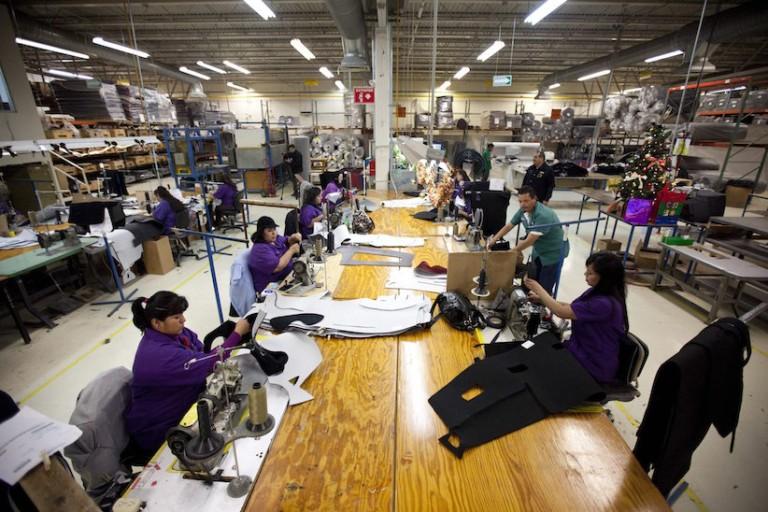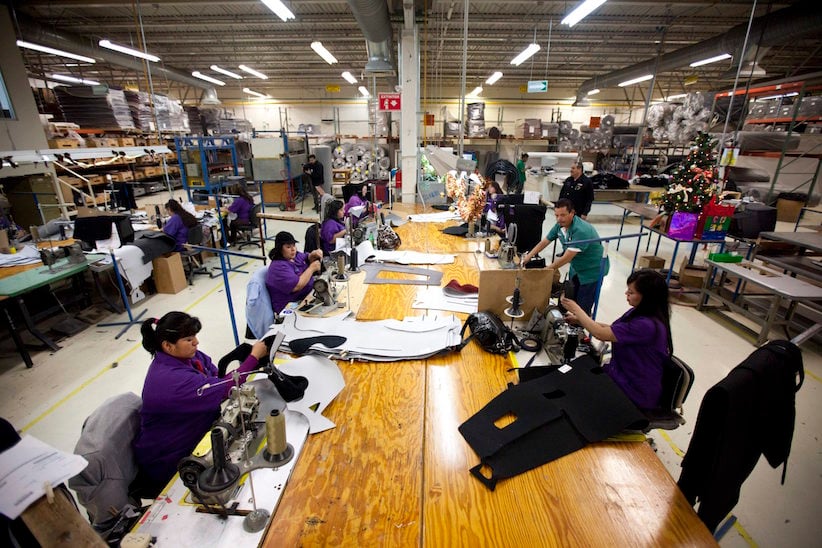How many jobs has NAFTA really cost the U.S.?
Trump’s trade czar puts it at 700,000, close to what Bernie Sanders claimed in his presidential run. Others differ.

In this Dec. 27, 2013 photo, workers manufacture car dash mats at a maquiladora belonging to the TECMA group in Ciudad Juarez, Mexico. (AP Photo/Ivan Pierre Aguirre)
Share

President Donald Trump’s trade czar adopted a grim tone today in Washington at the start of talks aimed at revamping the North American Free Trade Agreement, leaving no doubt that a difficult task lies ahead for Canadian and Mexican negotiators.
“The numbers are clear,” said U.S. Trade Representative Robert Lighthizer, setting up arguably his key point. “The U.S. government has certified that at least 700,000 Americans have lost their jobs due to changing trade flows resulting from NAFTA.”
That’s a lost-jobs number big enough to land with a dispiriting thud. I have asked the Office of the United States Trade Representative where exactly Lighthizer is getting that “certified” 700,000 estimate. I haven’t heard back yet (and I’ll update this story when I do), but meanwhile I have the feeling I’ve heard that sort of figure before. Oh, here it is—from Bernie Sanders, back when his surprisingly strong run from the left for the Democratic nomination was in full swing last year, and he was accusing Hillary Clinton of supporting “disastrous trade agreements, written by corporate America,” and singling out NAFTA as having “cost us 800,000 jobs nationwide.”
Sanders was reportedly relying on a study from the Economic Policy Institute (EPI), an independent think tank that describes itself as being particularly concerned with “the needs of low- and middle-income workers.” Not everybody sees things the EPI’s way, though. For instance, the U.S. International Trade Commission (USITC) reported last year that research generally finds that NAFTA has resulted in “a substantial increase in trade volumes for all three countries” and “little to no change in U.S. aggregate employment.”
Some detailed analysis on this question has come from a private, nonpartisan group called the Peterson Institute for International Economics (PIIE). “In recent years,” PIIE’s economists wrote in one report, “net U.S. jobs lost on account of two-way trade with Mexico have averaged about 15,000 annually (203,000 jobs displaced by imports minus 188,000 jobs supported by imports).” That’s not employment carnage, especially when you consider that the export-oriented jobs created for Americans generally pay quite a lot better than the ones they lost to Mexican import competition.
I’m assuming the job losses Lighthizer mentions would mostly be blamed on low-wage Mexican competition, but no doubt some NAFTA skeptics in the U.S. see Canadian competition as an unfair threat, too, at least in some sectors. Of course, the Canadian government has been assiduously trying to push the opposite narrative, contending that almost nine million U.S. jobs rely on the sorts of trade and investment flows with Canada that NAFTA promotes.
Lighthizer briefly acknowledged that some “hardworking people” benefit from NAFTA, specifically noting “that communities along our borders have a particular equity in this agreement.” Then he quickly added, “But for countless Americans, this agreement has failed.” Some careful counting, though, would be helpful.